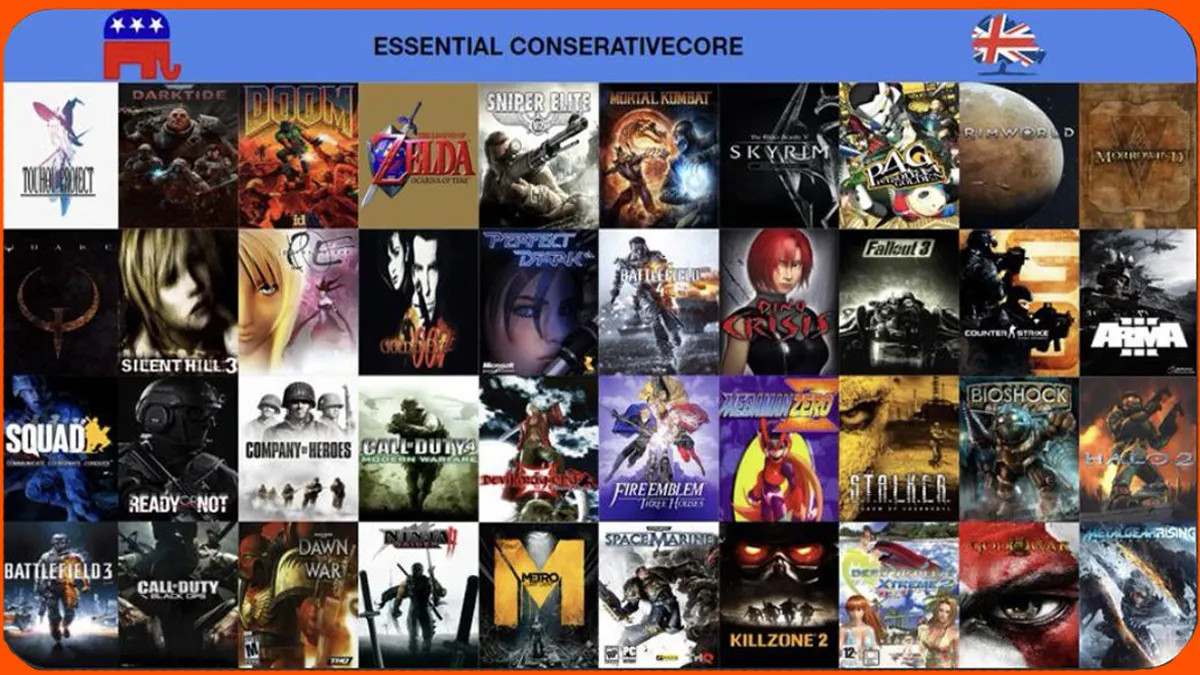Exploring Conservative Themes In Video Games & Beyond
Are video games, a medium often lauded for its escapism and technological prowess, becoming a battleground for ideological warfare? The very notion of "conservative core games" suggests a deliberate attempt to infuse political viewpoints into entertainment, raising questions about artistic integrity and audience manipulation.
The digital landscape is vast and varied, encompassing everything from casual mobile games to sprawling open-world adventures. Within this landscape, discussions about the political leanings of certain games are becoming increasingly prevalent. The phrase "conservative core" has emerged, prompting a deeper dive into the themes, narratives, and target audiences of various titles. This exploration examines the intersection of gaming and conservative values, aiming to understand how these values are reflected, promoted, or perhaps, inadvertently present within the virtual worlds we inhabit. The creators of "Conservative Core" news, who hold fiscally and socially conservative values, remain vigilant against what they perceive as "woke propaganda" and the influence of the liberal media, a sentiment that speaks to a broader cultural war being waged across various media.
The debate surrounding video games and political alignment is complex. Some games, due to their themes or narrative structures, may resonate more with conservative viewpoints. For example, a game that emphasizes personal responsibility, traditional family structures, or free-market capitalism might find favor within conservative circles. Conversely, games that promote progressive values or challenge established norms may be viewed with suspicion or outright criticism.
The games themselves, of course, are not monolithic entities. Titles that appear to champion conservative principles might, upon closer examination, contain complexities and nuances that defy simple categorization. Others might inadvertently reflect certain values, whether through their core gameplay loops or the ideologies of their creators. "Paradox games," for instance, while built on capitalist frameworks, might not be explicitly promoting conservatism, but rather reflecting the realities of power structures and economic systems inherent in their gameplay.
The very nature of the gaming industry, as a profit-driven enterprise, necessitates a broad appeal. This often leads game developers to attempt to be "everything to everyone," a strategy that can be challenging when trying to maintain a clear ideological stance. However, even within this landscape, distinct themes and narratives emerge, reflecting a range of perspectives and values.
Consider the case of a new reality series, "Beast Games," which was announced to be streaming on Amazon. The fact that those involved are suing both Amazon and MrBeast's company, MRB2024, owned by Jimmy Donaldson, suggests potential controversies and conflicts. It's important to remember that the realm of "Conservative Core" is not just limited to games. It's a space where vetted news focused on empowering individuals to preserve their way of life is disseminated.
The intersection of politics and art, including video games, has long been a topic of intense debate. Those who embrace the idea of "conservative core games" seek to identify and promote titles that align with their values. "Armed with a deep knowledge of red-blooded bible belt america as well as Oxford definitions of what words actually mean," these individuals embark on an exploration of how conservative principles are reflected in the gaming sphere.
In contrast, a game like "Fire Emblem" celebrates bonds regardless of origin/culture/beliefs, while "The Legend of Zelda" might appeal to conservatives with its depiction of characters. The focus remains on how these games resonate with specific audiences, which in turn reveals something about both the games and the audiences who engage with them. The "conservative core" itself emphasizes the importance of individual liberty, free markets, and traditional values.
The broader discussion around video games and political ideology goes beyond simple classifications. It touches on the very nature of storytelling, the role of empathy, and the potential impact of media on shaping our worldviews. The evolution of video games has mirrored the evolution of society. In that sense, all games are a product of their cultural context.
A closer examination of games, their themes, their gameplay, and their characters, reveals an interesting microcosm. These elements also help reflect our own values and understanding of the world around us.
The following table provides an overview of MrBeast, a key figure in the gaming and entertainment industry:
| Category | Details |
|---|---|
| Full Name | Jimmy Donaldson |
| Also Known As | MrBeast |
| Born | May 7, 1998 (Age 25) |
| Birthplace | Wichita, Kansas, USA |
| Nationality | American |
| Education | Greenville Christian Academy (dropped out) |
| Occupation | YouTuber, Businessman, Philanthropist |
| Known For | YouTube videos featuring challenges, stunts, and charitable giving; Founder of MrBeast Burger |
| YouTube Channel | MrBeast (Official YouTube Channel) |
| Company | MRB2024 |
| Net Worth | Estimated around $100 million |
The controversy surrounding "Squid Game" highlights the subjective nature of reviews, with differing opinions and interpretations. A critique of Ayn Rands Atlas Shrugged which involves a libertarian business tycoon pushing the limits of science and technology is a common theme in gaming, where utopian ideals frequently clash with human nature, resulting in dramatic narratives.
Consider the role of empathy in storytelling, a crucial ingredient for creating compelling narratives. Understanding the nuances of different cultures, perspectives, and beliefs is paramount for creating games with lasting impact. The interplay of political stances with the creative processes of the game developers, and the marketing strategies they deploy, is often a complicated issue. "They attempt to be everything to everyone, while still maintaining their necessarily conservative core." This also adds more complexity to the conversation about video games and ideology.
Whether the context is about video games, the cultural world, or the business realm, the notion of a "conservative core" underscores the dynamic interplay between values, narrative, and audience reception. The games themselves are often the subject of debate, whether they are considered to be "40 video games that are conservative," or those titles are considered to be examples of entertainment. Regardless of specific titles, there is no question that the conversation surrounding video games will remain as a reflection of our ever-evolving social and political landscape.
There are additional resources available with more in-depth information. Those looking to better understand the discussion can search for "A sub to ask conservatives questions with the intent of better understanding conservativism and conservative perspectives." And, the exploration of the role of basic empathy in storytelling, and the technical prowess of game development, will continue to shape our understanding of video games.
This article is meant for informational purposes and does not necessarily reflect the views of all gamers or the gaming community. The subject of video games and political ideology is multifaceted and open to interpretation.


